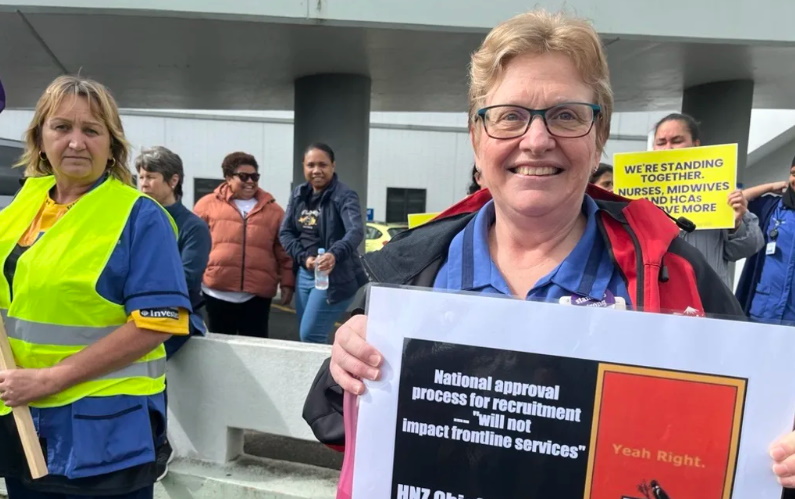Politics
Assaults on Hospital Workers Surge 30% in Two Years

Reports indicate that assaults on hospital workers in New Zealand have surged by 30% over the past two years. In the twelve months leading up to June 2024, there were 7,777 reported assaults on Health NZ hospital staff. This alarming trend has raised concerns among healthcare professionals, with some suggesting the actual number of incidents could be even higher due to underreporting.
Frontline workers cite significant challenges in reporting assaults, as many lack the time or resources to do so. According to Tracy Chisholm, a nurse at Waikato Hospital, “Finding the time to report an assault is a challenge.” Chisholm, who works in the emergency department, noted that verbal abuse and threats have become routine. “If you multiply that by 120 nurses every week, it’s almost become an accepted part of our workplace,” she added.
The statistics reflect a troubling trend: 6,635 assaults were reported for the year ending June 2023, and 5,001 the previous year. Health NZ has clarified that these figures may include incidents occurring outside hospital premises, such as a staff member being threatened at gunpoint earlier this year while leaving work.
Security Measures and Underlying Causes
In response to these rising figures, Health NZ has implemented measures to enhance security within hospitals. Chisholm emphasized that while many staff feel secure due to the presence of security personnel, the effectiveness of these measures can vary. “ED is lucky. We technically have security 24-7, but when we have those patients that provide a threatening environment for us, it will depend on who’s around us for how safe we feel,” she noted.
Calls for improved security protocols have intensified, with suggestions that security officers be granted enhanced powers to intervene during incidents. Chisholm pointed out that frustrations among patients often stem from lengthy wait times, which can lead to aggressive behavior. “If you think about a 12-hour wait in an ED waiting room overnight… you’d be getting really grumpy. That comes out on the nurses,” she explained.
The executive director of the Association of Salaried Medical Professionals, Sarah Dalton, echoed these sentiments, attributing the rise in assaults to inadequate access to timely care and insufficient resources for managing high-stress situations. “I think you have to look to the heart of this issue and that’s people’s frustrations at not being able to access care,” Dalton stated.
Health NZ’s Response and Future Steps
Health NZ is actively addressing these safety challenges, with interim chief human resources officer Robyn Shearer revealing that the organization has allocated $31 million to bolster security, particularly in emergency departments. This funding has allowed for the addition of 44 extra security officers at larger hospitals, alongside training for over 1,600 emergency department staff in violence reduction techniques.
Shearer acknowledged that the healthcare system faces broader societal pressures, including staffing shortages and the need for safe waiting areas for patients exhibiting behavioral issues. “The healthcare system, like many other services, is impacted by wider societal trends,” she noted.
Despite the increased funding and training, Shearer indicated that empowering security officers with more authority would require legislative changes. The focus remains on de-escalation techniques, with law enforcement involvement as a last resort.
Chisholm and other staff members have reported instances of racial abuse, underscoring the need for appropriate support mechanisms within the healthcare environment. While Health NZ encourages reporting incidents, Shearer emphasized the importance of clear pathways for staff to raise concerns about their safety.
As violence against hospital workers continues to rise, stakeholders hope for effective solutions that ensure the safety of healthcare professionals while delivering high-quality care to patients. The troubling statistics serve as a reminder of the challenges faced by those in the healthcare sector and the urgent need to address the root causes of aggression in hospital settings.
-

 World3 months ago
World3 months agoTest Your Knowledge: Take the Herald’s Afternoon Quiz Today
-

 Sports3 months ago
Sports3 months agoPM Faces Backlash from Fans During Netball Trophy Ceremony
-

 Lifestyle3 months ago
Lifestyle3 months agoDunedin Designers Win Top Award at Hokonui Fashion Event
-

 Sports3 months ago
Sports3 months agoLiam Lawson Launches New Era for Racing Bulls with Strong Start
-

 Lifestyle3 months ago
Lifestyle3 months agoDisney Fan Reveals Dress Code Tips for Park Visitors
-

 World4 months ago
World4 months agoCoalition Forms to Preserve Māori Wards in Hawke’s Bay
-

 Health3 months ago
Health3 months agoWalking Faster Offers Major Health Benefits for Older Adults
-

 Politics3 months ago
Politics3 months agoScots Rally with Humor and Music to Protest Trump’s Visit
-

 Top Stories4 months ago
Top Stories4 months agoUK and India Finalize Trade Deal to Boost Economic Ties
-

 Entertainment3 months ago
Entertainment3 months agoExperience the Excitement of ‘Chief of War’ in Oʻahu
-

 World4 months ago
World4 months agoHuntly Begins Water Pipe Flushing to Resolve Brown Water Issue
-

 Science4 months ago
Science4 months agoNew Interactive Map Reveals Wairarapa Valley’s Geological Secrets









